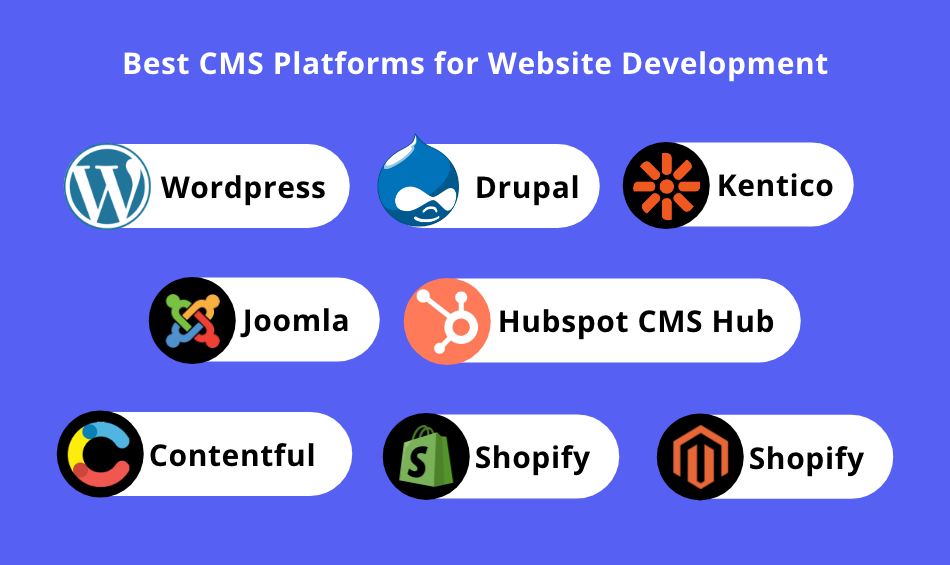Top-Rated CMS Platforms
When it comes to building a website in 2025, choosing the right Content Management System (CMS) is crucial. The CMS you select will determine how easily you can manage your site, its scalability, and its performance on search engines. Whether you’re building a personal blog, a business site, or an e-commerce platform, the right CMS can make all the difference. In this article, we’ll explore the top-rated CMS platforms for 2025, highlighting their features, ease of use, and why they are trusted by web developers and business owners.
1. WordPress: The Ultimate Choice for Flexibility
WordPress remains the most popular CMS in 2025, powering over 40% of all websites. It offers unmatched flexibility, a user-friendly interface, and an extensive ecosystem of plugins and themes. Whether you’re a beginner or an advanced developer, WordPress can cater to your needs.
-
Why choose WordPress?
-
Ease of use: With drag-and-drop editors like Elementor, users can easily design and manage their websites without any coding knowledge.
-
SEO-friendly: Thanks to plugins like Yoast SEO, optimizing your website for search engines has never been easier.
-
Customization: A vast selection of plugins and themes allows you to customize your site’s functionality to meet your unique needs.
-
Community support: WordPress has a large community, so help and resources are readily available.
-
Therefore, if you’re looking for a highly customizable, SEO-friendly CMS, WordPress is an excellent choice. To dive deeper, check out our article on How to Optimize WordPress for SEO.
2. Shopify: Best for E-Commerce in 2025
For anyone interested in creating an online store, Shopify is one of the top-rated CMS platforms in 2025. Known for its intuitive design and powerful e-commerce features, Shopify is an excellent choice for businesses of all sizes.
-
Why choose Shopify?
-
Dedicated e-commerce features: Shopify provides everything you need to sell products, track inventory, and accept payments from customers worldwide.
-
Scalability: Whether you’re just starting or managing a growing business, Shopify can scale with your needs.
-
App marketplace: Shopify’s App Store offers tools for marketing, customer service, and sales, allowing you to manage your business more effectively.
-
If you’re considering building an online store, read our article on How to Build an Online Store with Shopify for more insights.
3. Wix: The All-in-One Website Builder
Wix offers a powerful drag-and-drop website builder that is ideal for users with little to no technical experience. This platform is perfect for individuals, small businesses, and anyone looking to quickly set up a visually appealing website.
-
Why choose Wix?
-
Ease of use: Wix’s drag-and-drop interface makes it easy to design a website by simply moving elements around.
-
Templates: With hundreds of professionally designed templates available, Wix allows you to create beautiful websites for blogs, portfolios, and businesses.
-
SEO tools: Wix comes with built-in SEO tools to help you optimize your site and improve its visibility on search engines.
-
Additionally, Wix’s user-friendly design and robust features make it a great choice for anyone starting a new website. Learn more about Wix’s SEO potential in our article SEO Best Practices for Wix Websites.
4. Joomla: Ideal for Complex Websites
Joomla is perfect for developers and businesses that need a CMS offering more flexibility and control. While it may have a steeper learning curve, it’s ideal for those who need advanced functionality.
-
Why choose Joomla?
-
Flexibility and control: Joomla gives developers complete control over the backend and frontend of their websites, allowing for customized features.
-
Multilingual support: If you’re planning to build a website in multiple languages, Joomla’s multilingual capabilities make it a top choice.
-
Extensions: With thousands of extensions, Joomla can be customized to suit nearly any requirement.
-
Therefore, if you are an advanced user or a business with specific needs, Joomla offers the control and flexibility you need. Check out our guide on Joomla Development Tips for Advanced Users for more information.
5. Squarespace: Beautiful Designs with Built-in Features
Squarespace is known for its stunning, design-forward templates. Ideal for creators, artists, and small businesses, Squarespace lets you build a beautiful website with ease, without the need for design skills.
-
Why choose Squarespace?
-
Visually appealing templates: Squarespace’s templates are some of the most aesthetically pleasing on the market, perfect for portfolios and personal websites.
-
Built-in features: From hosting and security to e-commerce and analytics, Squarespace provides all the tools you need.
-
Mobile responsiveness: Every Squarespace template is optimized for mobile devices, ensuring that your site looks great on any screen.
-
If you’re focused on design and user experience, explore our article on Top Squarespace Templates for Creative Websites for inspiration.
6. Webflow: Advanced Design and Customization
Top-Rated CMS Platforms. For web designers who need complete control over their site’s design and functionality, Webflow is the perfect CMS. It combines the best features of visual design tools and traditional web development, making it a top choice for designers who want flexibility.
-
Why choose Webflow?
-
Design freedom: Webflow allows you to design custom websites without writing code, yet it offers full control for developers who want to add custom code.
-
CMS functionality: Webflow provides a powerful CMS that’s ideal for content-heavy sites like blogs and news outlets.
-
SEO control: With Webflow, you have full control over your site’s SEO settings, helping you fine-tune its optimization.
-
For designers looking for advanced customization options, Webflow is a powerful solution. To explore its capabilities further, read our article on How Webflow is Revolutionizing Website Design.
7. Ghost: A CMS for Bloggers and Publishers
For those focused on blogging and content publishing, Ghost is a top-rated CMS that provides a minimalist, fast platform designed specifically for publishing.
-
Why choose Ghost?
-
Speed and performance: Ghost is optimized for speed, making it a top choice for content-heavy websites where performance matters.
-
Content-focused: Its clean interface ensures that users can publish content efficiently, without distractions.
-
SEO-friendly: Ghost automatically generates SEO-friendly URLs, sitemaps, and metadata, helping your content rank higher in search engines.
-
If you’re a blogger, Ghost can streamline your publishing process. Learn how to get started with Ghost by reading How to Start a Blog with Ghost.
Conclusion
In 2025, there will be plenty of excellent CMS platforms to choose from, each catering to different needs. Whether you’re looking for simplicity, flexibility, or advanced features, there’s a CMS for you.
-
For beginners and bloggers: WordPress, Wix, and Squarespace offer ease of use with beautiful templates.
-
For businesses and e-commerce: Shopify provides a comprehensive solution for managing online stores.
-
For developers and advanced users, Joomla, Webflow, and Ghost offer greater control and customization.
No matter your website’s goal, selecting the right CMS platform is key to success. Explore the options available, and choose the one that aligns with your vision for 2025.
For further guidance on selecting the right CMS, don’t miss our articles like How to Choose the Best CMS for Your Business and The Future of CMS Platforms: What to Expect in 2025.





